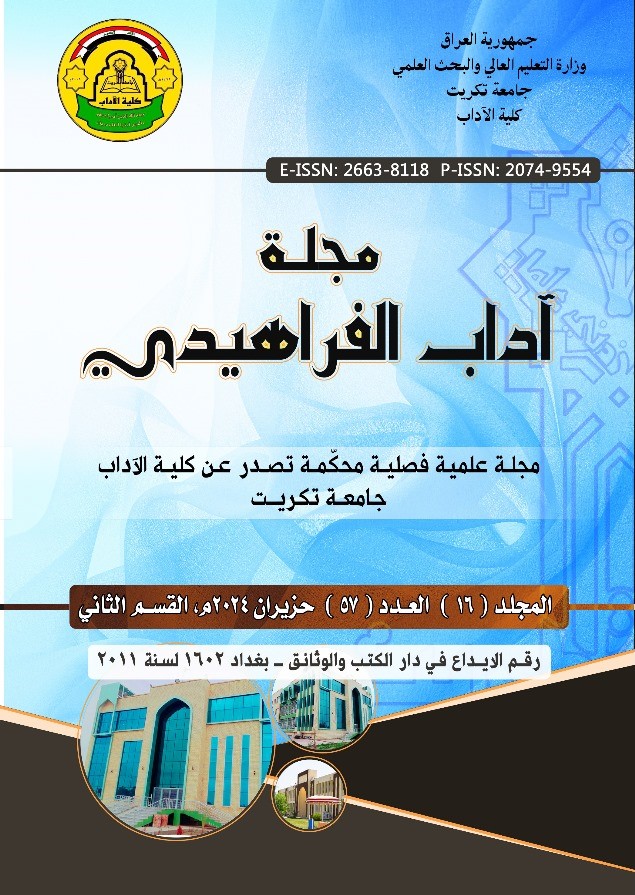اسطورة رميم - دراسة تحليلية
الكلمات المفتاحية:
الحكاية الشعبية، نص رميم، الحكاية الخرافية، خيال الطفل، الاسطورة رميمالملخص
اطفالنا كلهم بلا استثناء يملكون خيالاً واسعاً، ولكن مع تقدم العمر يقل الخيال لدى الاطفال باستثناء الطفل الذي اعمل مخيلته كثيراً. ولن نجد فرد من افراد المجتمع تفوق في مجال اختصاصه وأبدع فيه، وقدم الجديد الا وقد استطاع ان يخرج من التفكير التقليدي والشائع وسرح بخياله المتدرب على الابتكار منذ الطفولة، لينتج فكرة او حل جديدة لم يتطرق ذهن أحد اليه من قبل. والخيال قدرات عقلية قابلة للنمو، فهي تنمو كما ينمو الجسد، إذا ما حظي بعوامل مساعدة على التفكير والابتكار وتحريك القدرات وتنمية مهارات الحياة، والاسطورة احدى اهم العوامل المساعدة على تنمية خيال الطفل، بما تملكه من مقومات وخصائص تسمو بعقل الطفل وخيالة الى اللامحدودية في المكان والزمان والقدرة الجسدية.
والبحث الذي يهتم بتحليل الاسطورة فانه يبحث ايضا في قدرتها على تنمية خيال الطفل ولقد توصل الى العديد من النتائج عبر منهج تحليل المضمون واهم هذه النتائج هي:
1. تعد اسطورة رميم من الاساطير الموصلية التي تحمل في ثناياها مجموعة من القيم الاخلاقية والاجتماعية والدينية، وتعكس نمطاً ثقافياً امتازت به مدينة الموصل.
2. تسمح اسطورة رميم بطرح فضاء تخيلي واسع لمستمعيها من الاطفال حيث انها تحمل في ثناياها، مجموعة من المعتقدات التي تعد من الموروث الاجتماعي، ومنها التشاؤم من الغراب، والخوف من السحر والسحرة، الاغتراب والبُعد عن الاهل.
المراجع
(no date). Retrieved from Al-Qafila Magazine: https://qafilah.com.
Ibrahim Al-Haidari. (1984). Ethnology of Traditional Arts (Version 1). Syria: Dar Al-Hiwar.
Ahmed Kamal Zaki. (1979). Myths - a comparative cultural study (Version 2). Beirut: Dar Al Awda.
Ashley Montagu. (1965). The first million years of human life. (Ramses Lutfi, The Translators) Arab Register Foundation.
Al-Munajjid fi al-Lughah (twenty-third edition). (no date). Beirut: Dar Al-Mashreq.
Bronislaw Malinowskin. (no date). Myth in primitive sociology. (Saeed Ahmed Al-Hakim, the translators) Iraq: Ministry of Culture and Information.
B, and Grimal. (1991). Man, and myth. Foreign Culture Journal, 11(2), 40.
Joseph Campbell. (1999). The Power of Myth (Version 1). (Hassan Saqr and Maysaa Saqr, the translators) Damascus - Syria: Dar Al-Kalima for Publishing and Distribution.
Dr. Ibrahim Al-Haidari. (previous source). Ethnology of traditional arts.
Dr. Thomas George. (1988). Family Psychology (Version 1). Beirut, Lebanon: Dar Al-Jeel.
Daoud Salman Al-Shuwaili. (1980). The hero in our popular stories. Popular Heritage Magazine, 11(4).
Saeed Alloush. (1985). A dictionary of contemporary literary terms. Beirut: Lebanese Book House.
Saeed Alloush. (no date). A dictionary of contemporary literary terms.
Samir Rawhi Al-Faisal. (previous source). Children's literature and culture - a critical reading.
Sayed Muhammad Al-Qamni. (1993). Myth and Heritage (Version 2). Cairo: Sina Publishing.
Talal Salem Nayel. (1977). The role of popular traditional arts and their impact in establishing virtuous values. Popular Heritage Magazine, 8(2).
Abdul Bari Abdul Razzaq Al-Najm. (1976). The legend of Ramim. Popular Heritage Magazine, 7(8, 9).
Abdel Basset Sida. (1995). From mythological awareness to the beginnings of theoretical philosophical thinking in Mesopotamia in particular. Damascus: Dar Al-Hasad.
Abdel Basset Sida. (no date). From mythical awareness to the beginnings of theoretical philosophical thinking.
Abdel-Baqi Al-Harmasi, and others. (2000). Religion in Arab Society (Issue 2). Arab Sociological Association, Center for Arab Unity Studies.
Abdul Hamid Mohamed. (1998). Myth in Mesopotamia (Creation and Formation) (Version 1). Damascus: Aladdin Publishing House.
Abdul Hamid Younis. (2009). Dictionary of folklore. Egyptian General Book Authority.
Abdul Hamid Younis. (D.T.). Folktale. Cairo: Egyptian General Authority.
Abdul Rahman Al-Issawi. (1982). The psychology of myth and scientific thinking. Egypt: Knowledge Facility in Alexandria.
Abdul Latif Mahfouz. (September, 2007). Transcendent relationships between the folk tale and the genres interacting with it. Retrieved from www.doroob.com.
Omar Muhammad Al-Talib. (1981). The impact of the environment on the Iraqi folk tale, Book (2), Small Encyclopedia (86). Baghdad: Al-Jahiz Publishing House.
Show me Eggs. (previous source). How do we understand our children?
Moses, and Solomon. (1983). Narrative literature among the Arabs - a critical study of ancient stories. Lebanese Book House.
Bela Abraham. (1976). The legend, the small encyclopedia (54). Baghdad.
Nabila Ibrahim. (D.T.). Forms of expression in popular literature. Egypt: Dar Al Nahda.
Hadi Noman Al-Hiti. (1978). Children's culture. Kuwait: Al Resala Press.
Youssef Amin Qusay. (1976). Stories and philosophy. Baghdad: Shafiq Press.


